Electric Paint is electrically conductive, water-based, and non-toxic paint, and air-dries at room temperature. It is great for fast prototyping with printed electronics, fixing small repairs in circuits, or painting large interactive murals.
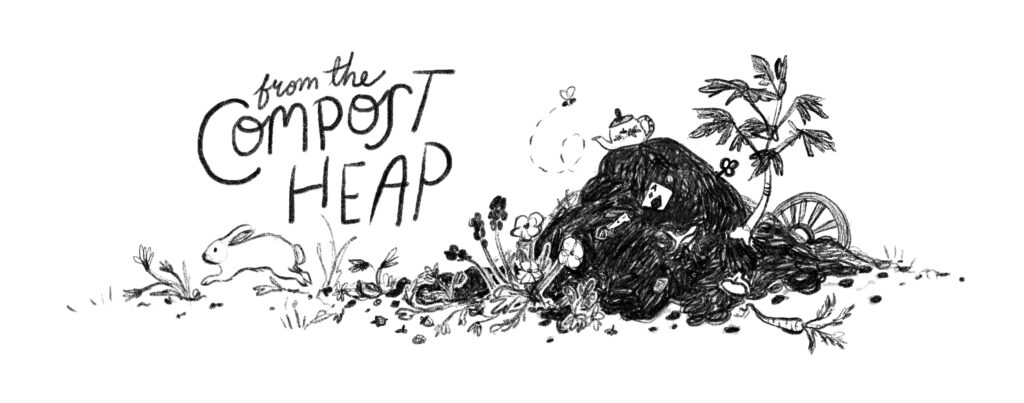
-
Read more: untitled post 156077320
I love this imagery of celestial phenomena (including northern lights, meteor showers, etc.) in relation to the recent eclipse and aurora borealis. I’ve been thinking about how people in medieval times would have experienced this. According to these broadsheets they were interpreted as signs of the end times (some things never change) and an act of God.
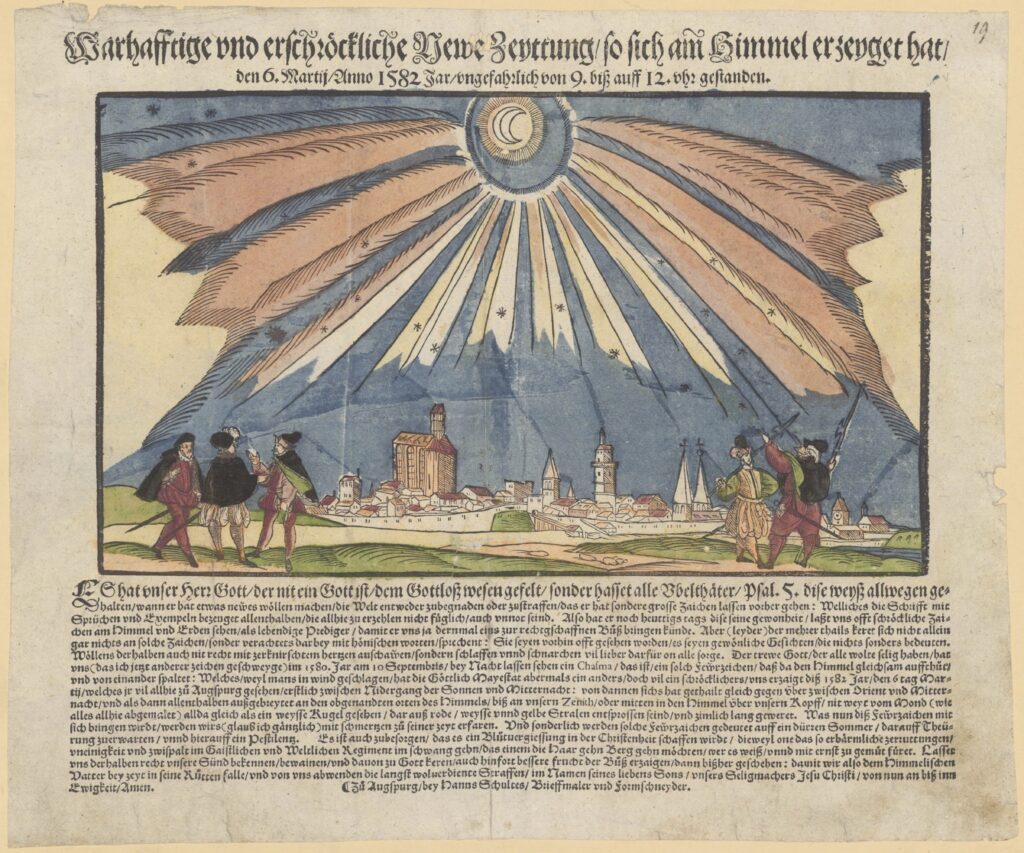
Northern lights observed over Ausburg on March 6, 1582, interpreted as an omen of disaster. 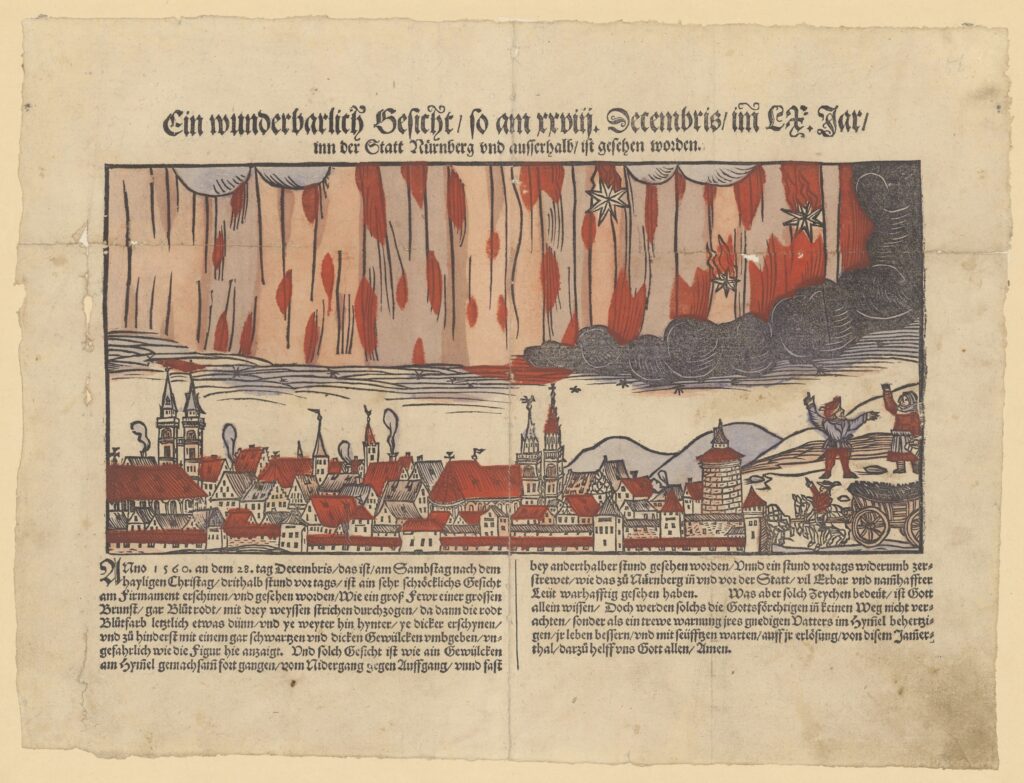
Report of a northern lights phenomenon observed over Nuremberg on December 28, 1560. The text interprets the natural phenomenon as a warning sign from God. 
Report including a pictorial representation of a northern lights phenomenon (“a great broad long flame”) over Eggolsheim near Forchheim on December 28, 1560. 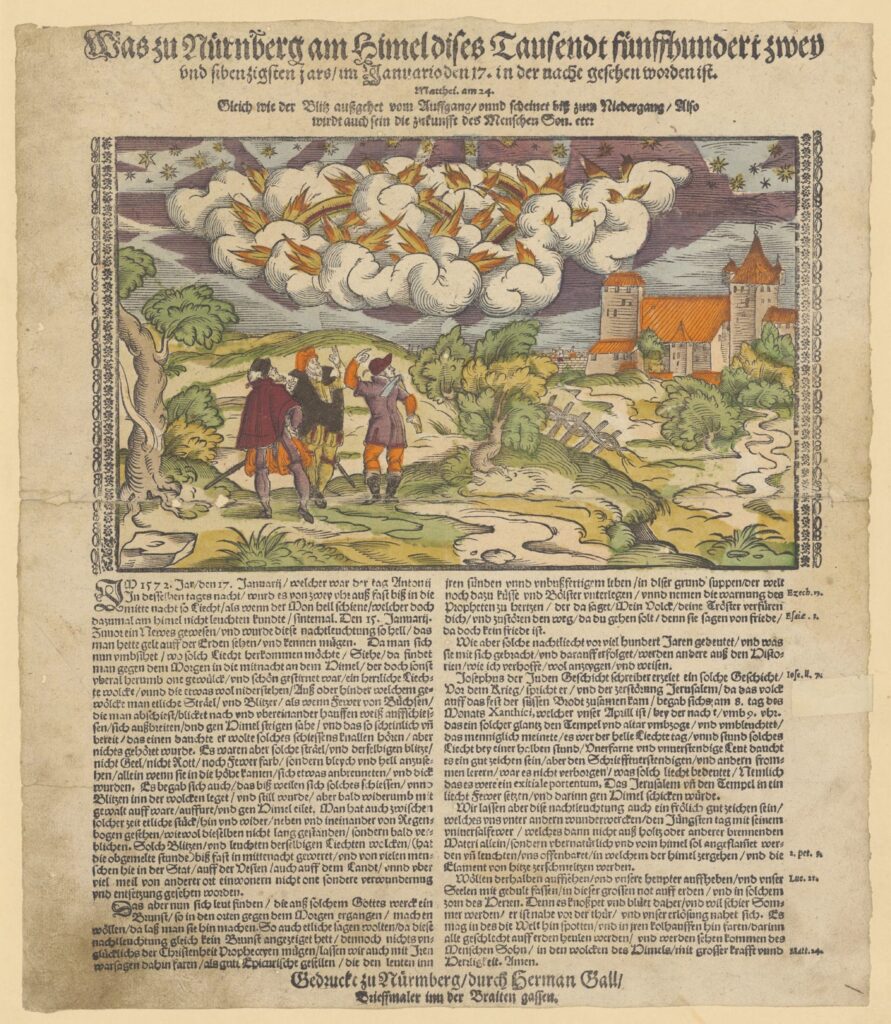
Report of northern lights over Nuremberg on January 17, 1572, in the evening from eight o’clock until around midnight. The author of the text compares the northern lights with the heavenly glow above the Temple of Jerusalem and interprets the event as a divine sign of the end-time fire of the impending Last Judgement.
Other Celestial Phenomena
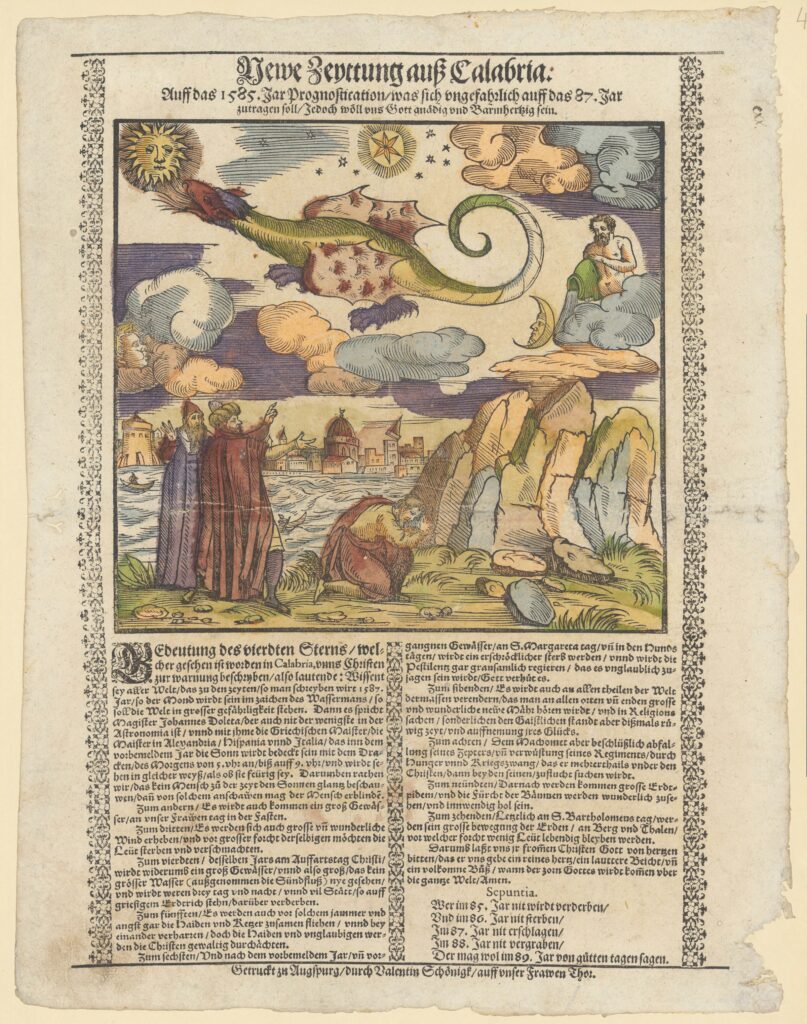
Depiction of a star that was seen in Calabria, with a fire-breathing dragon and the zodiac sign Aquarius. The text includes a prognostication for the years 1585 to 1587, which announces numerous catastrophes and political upheavals. 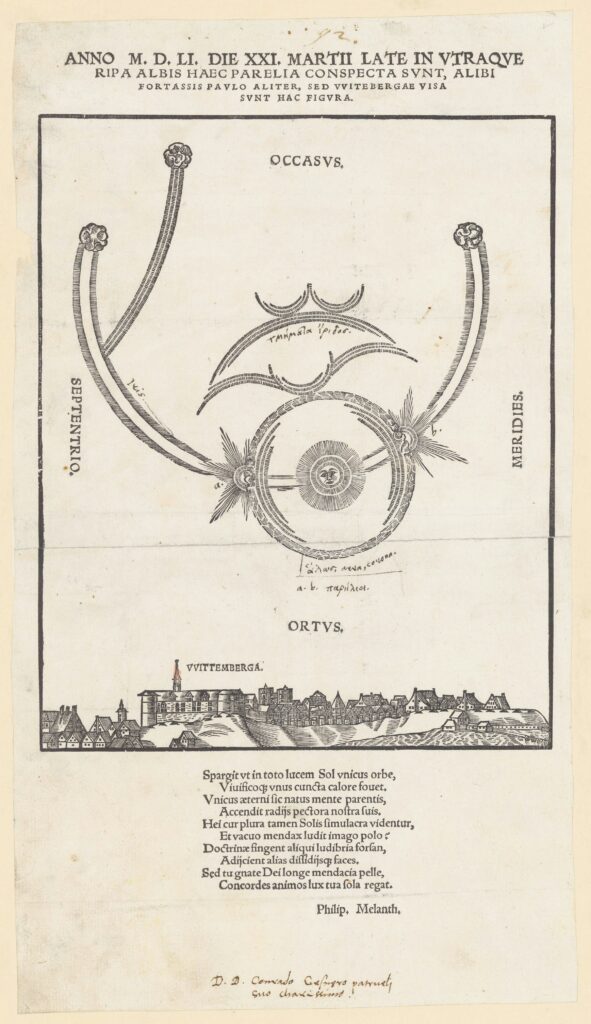
Halo or secondary sun apparition over the Elbe on March 21, 1551 with the silhouette of Wittenberg below. 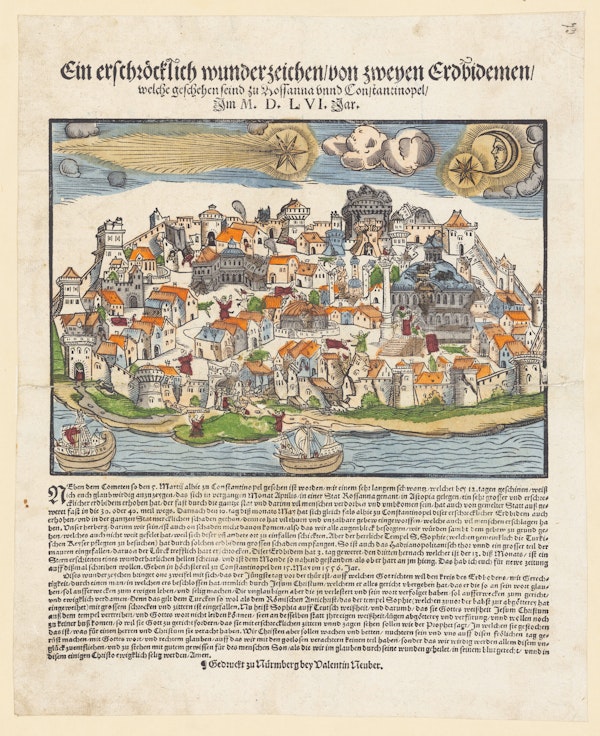
“The terrible miracle of two earthquakes which happened in Rossanna and Constantinople in 1556”, interpreted as a sign of the Last Judgement, foretold by comets. Note the damage to the Hagia Sophia. 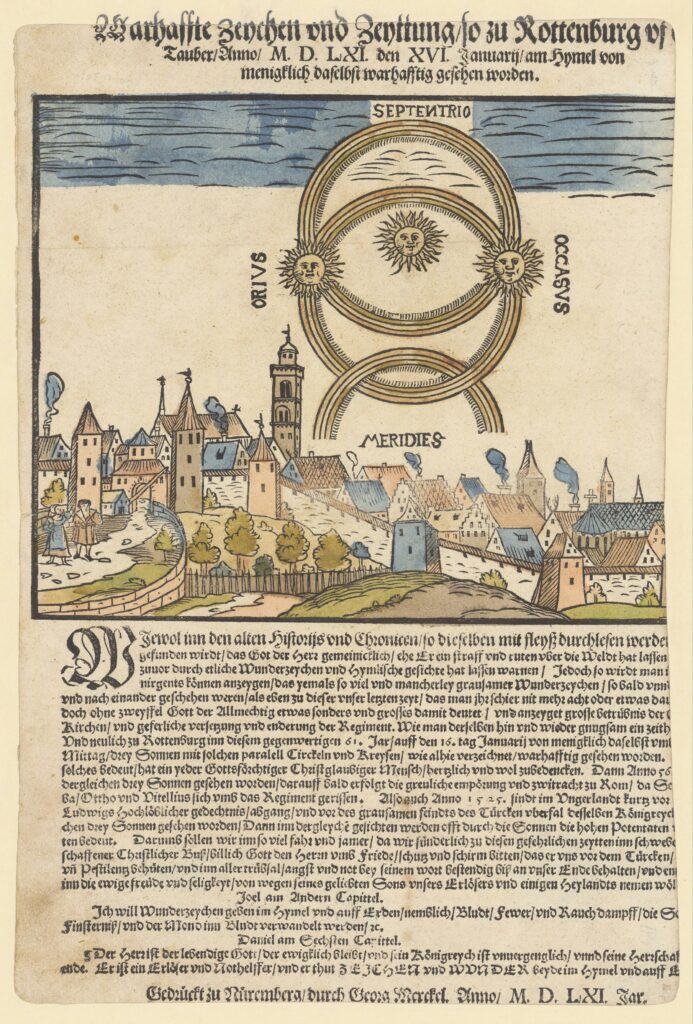
Report and depiction of a halo and secondary sun apparition on January 16, 1561 over Rottenburg ob der Tauber, which is interpreted as an end-time warning sign. 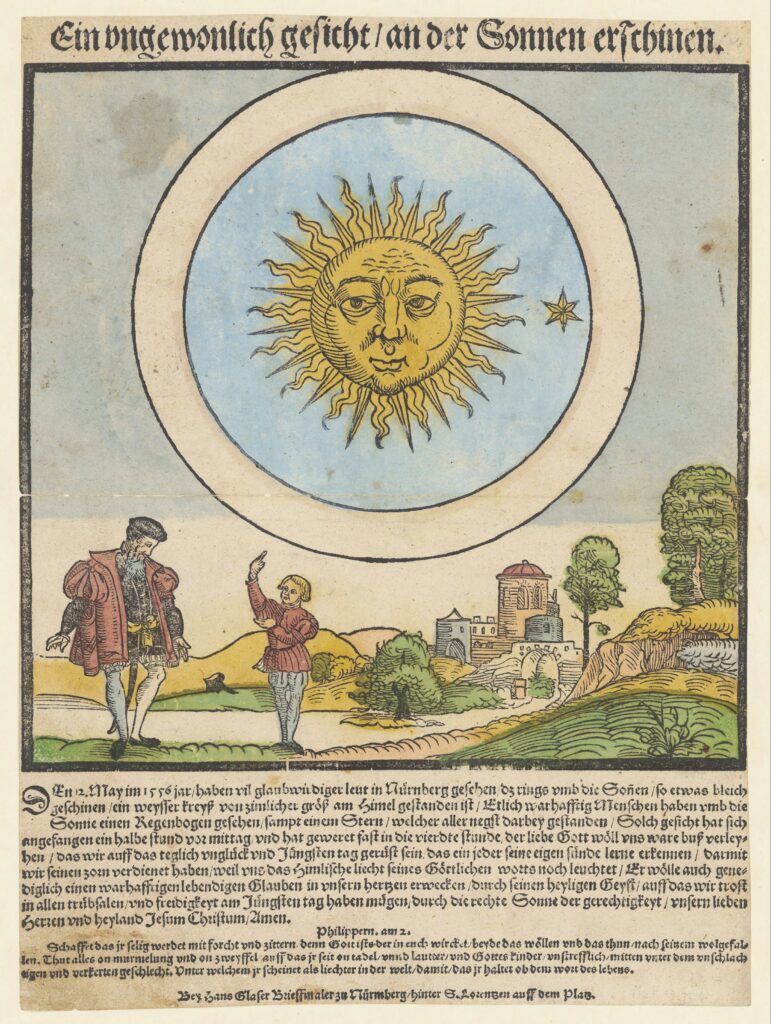
“An extraordinary face appeared as the sun.” Report of a halo around the sun on May 12, 1556 over Nuremberg. The celestial apparition was interpreted as a warning from God to mankind. 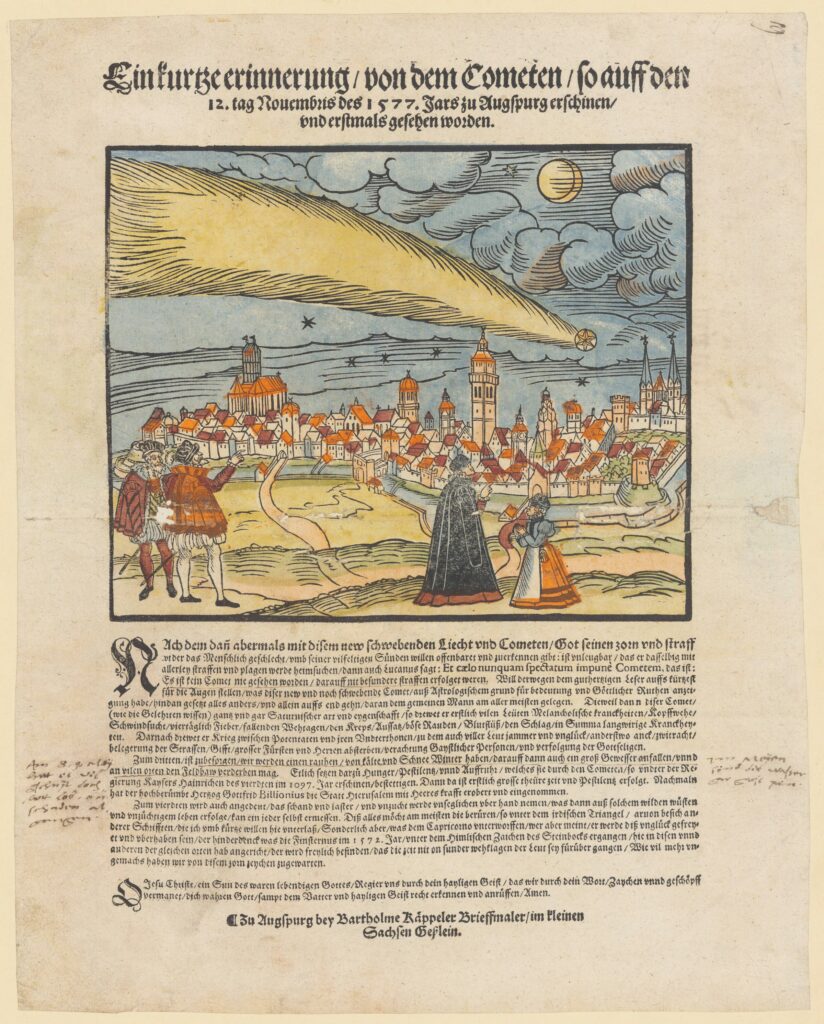
The comet that appeared over Augsburg in November, 1577. 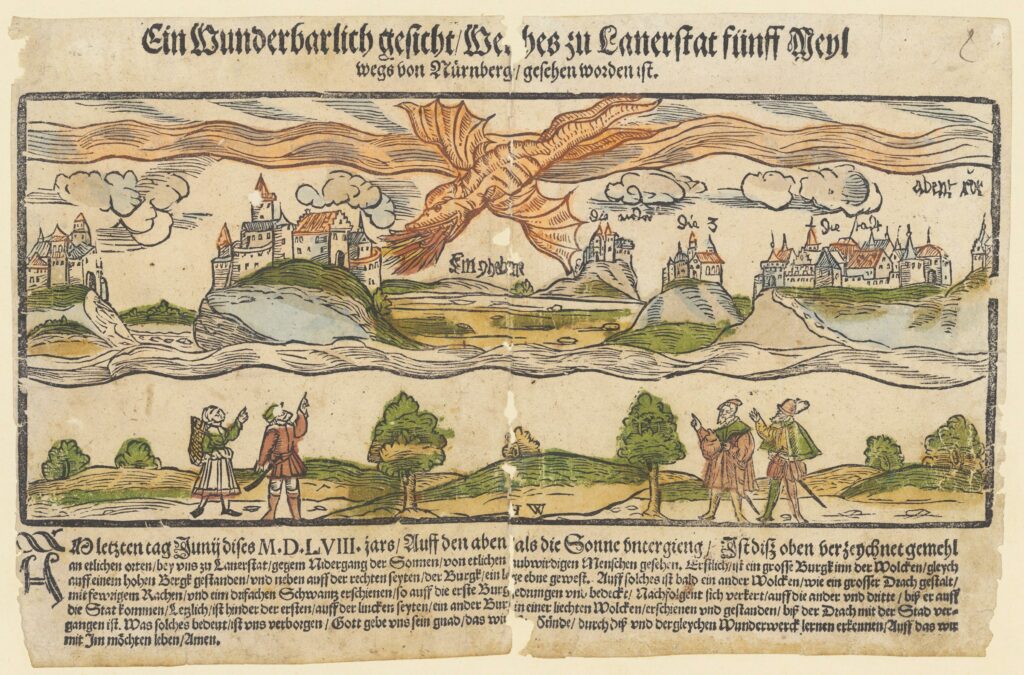
Report on an ominous apparition in the sky of Lonnerstadt near Erlangen, 1558. The weather phenomenon depicted is related to the dragon of the Apocalypse as a sign of the end times in Revelation 12. 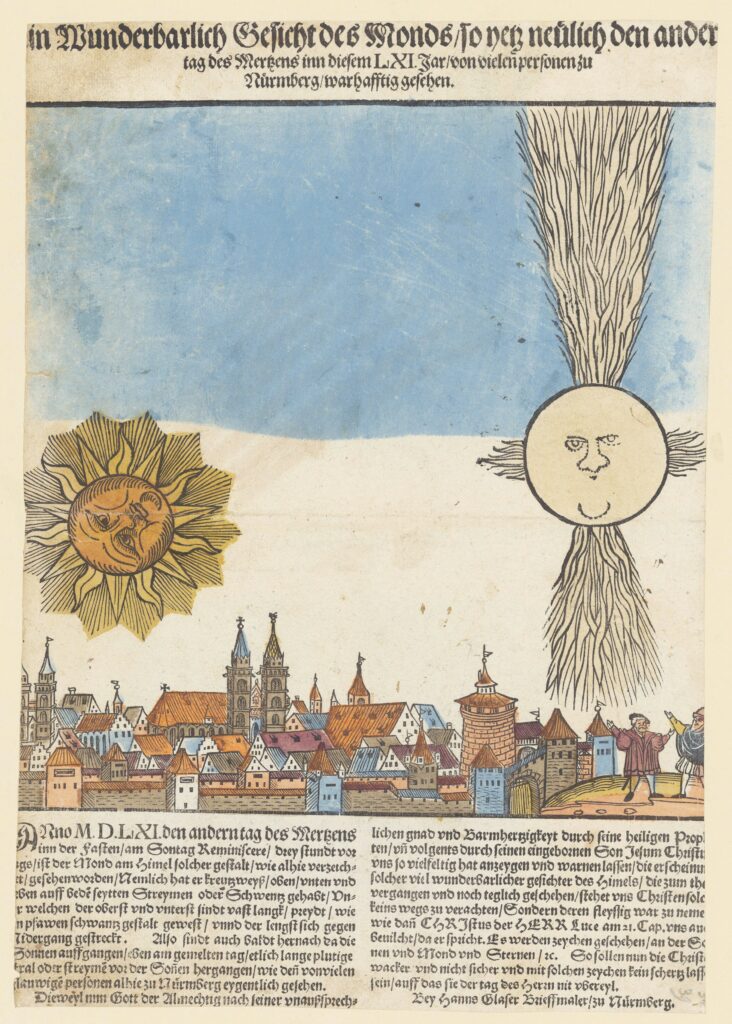
Report of the apparition on March 2, 1561 in Nuremberg. The broadsheet claims that the divine signs should be taken seriously in view of the Last Day and will lead to a penitential life on earth. Most of these come from Einblattdruck, a form of broadsheet that consisted of a title, woodcut, and an account of wonder. These sheets could be created rapidly, disseminated widely, and purchased cheaply. News and current events were thus being printed with greater speed and reach than ever before.
I’m fascinated by the fact these broadsheets have been painted!
I now want to research the process of early woodcut broadsheets.
Browse even more at Zurich’s Zentralbibliothek.
Observations from Solar Eclipse 2024
We experienced a partial eclipse. There was only the tiniest sliver of sun showing. Looking through the glasses at a bright yellow orange cookie with a larger and larger bite missing feels removed. Like it’s hard to believe it’s really happening.
Meanwhile the environmental effect is very real. The light ever so slowly dimming and becoming less contrasted. Like a Supernatural filter descending on the world. (The SPN TV show – not the genre.)
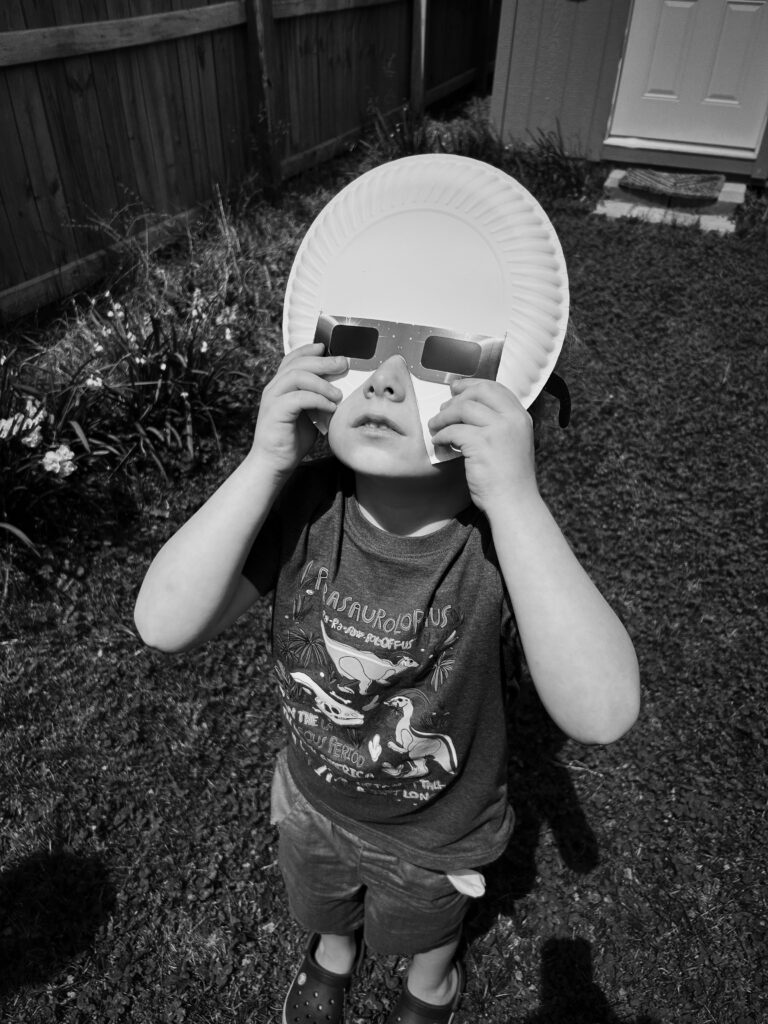
The shadows (when viewed from a longer distance – like tree branches or a colander raised in the air) dance with crescents.
I tried many artsy shots, but the best one seems to be this.
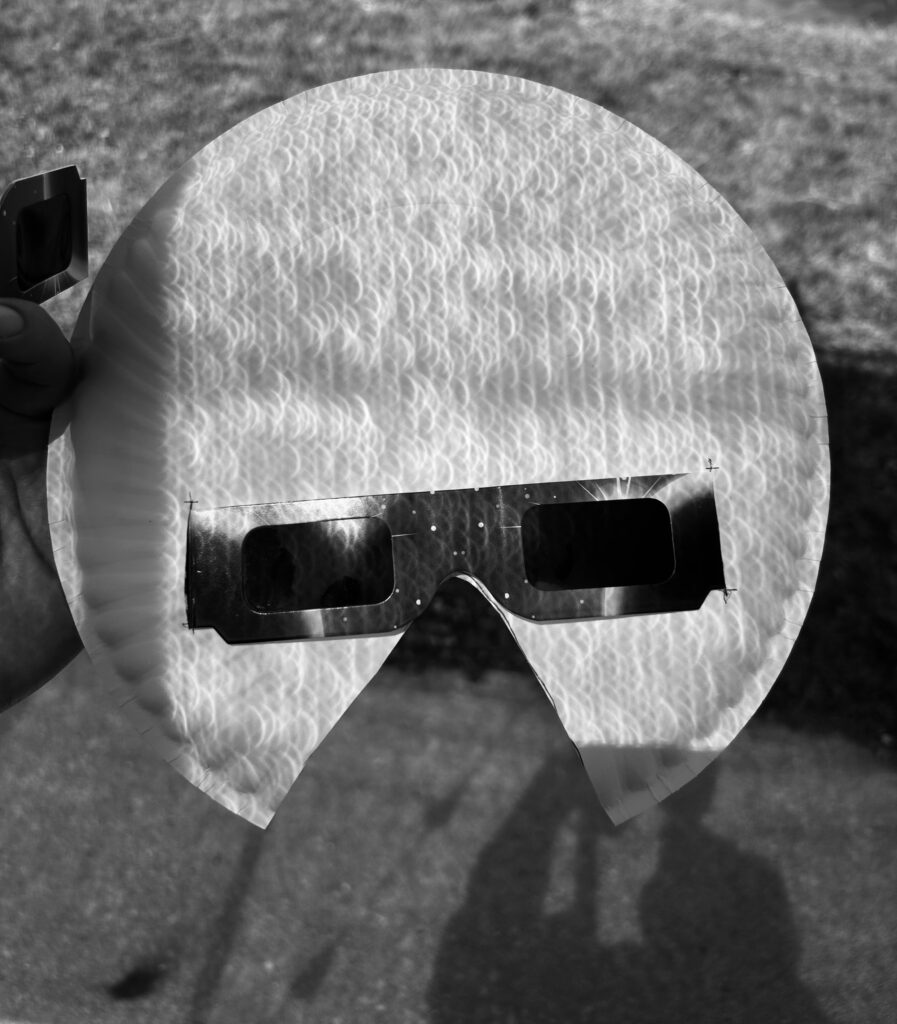
The eclipse challenges our sense of normalcy in a way that feels inspiring re fiction writing. What other small things (the shape of a shadow) can make the world feel magic?
Observations from Aurora Borealis 2024
I can’t believe we could actually see this in Arkansas. To be fair, the effect to the naked eye was very dull (like a mauve smudge on the sky), but the camera was like a portal into another dimension.
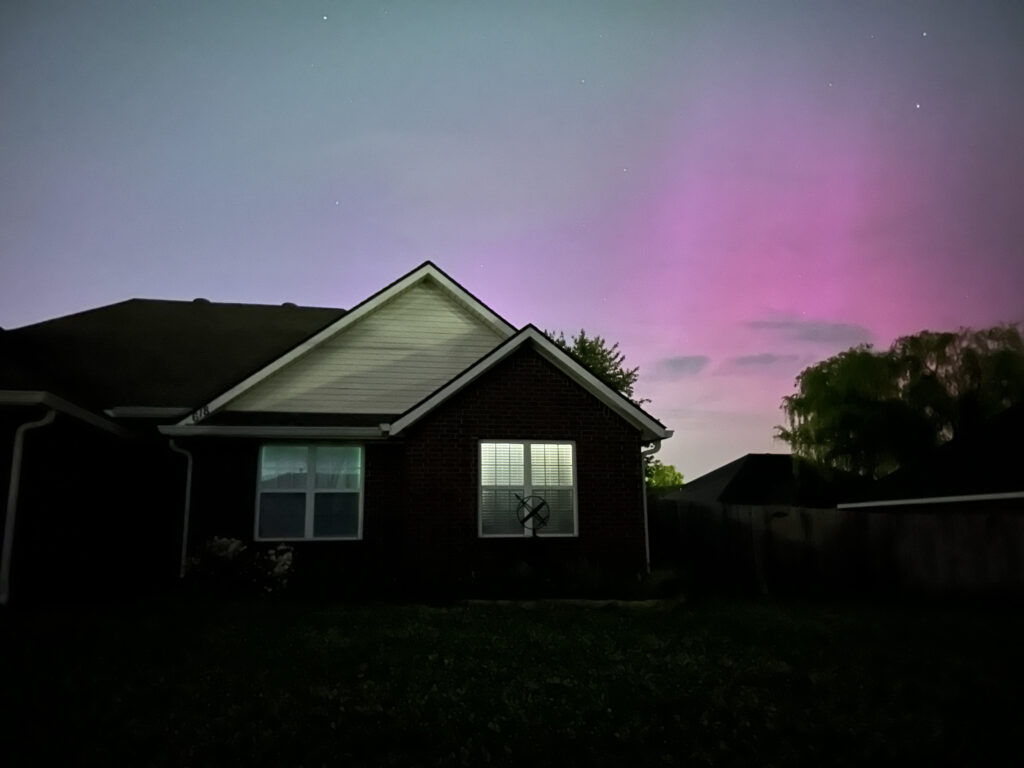
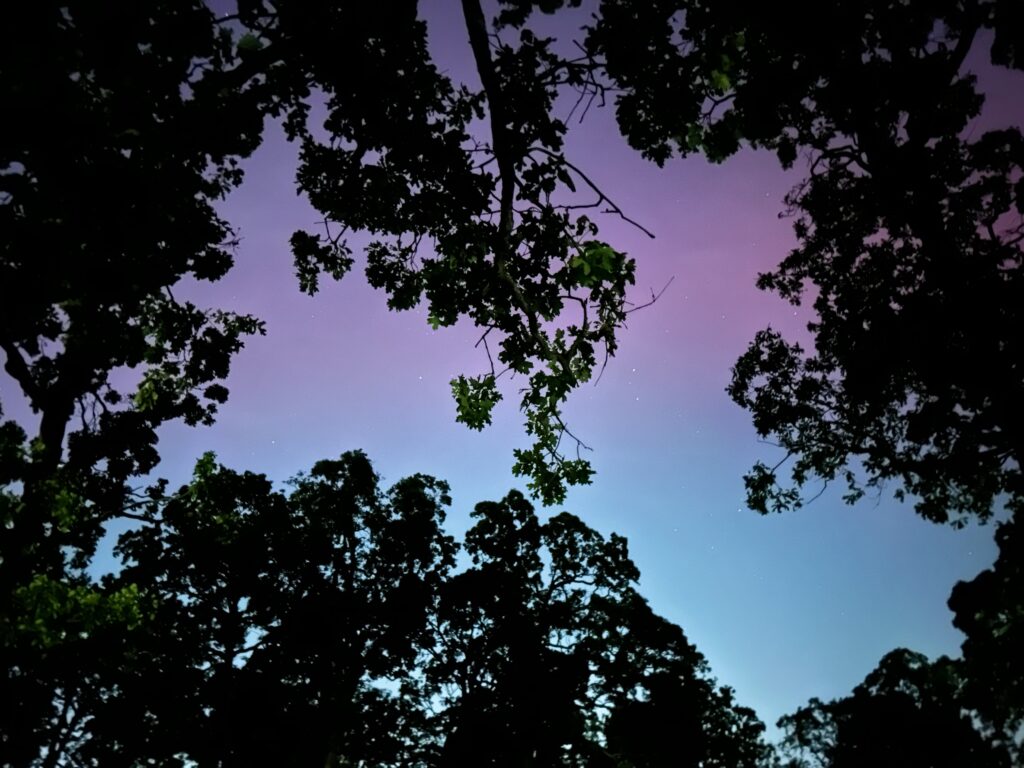
-
Read more: untitled post 156077270
Fascinated by this process of Crafting Ceramic Circuits by Artist Clement Zheng.
-
Read more: untitled post 156077312
I love colloquialisms so I just ordered the audiobook of Landmarks by Robert McFarlane based on a recommendation with these examples from Robin Sloan:
ammil a Devon term for the fine film of silver ice that coats leaves, twigs, and grass when freeze follows thaw
This is something we see a lot in the American south and I am always enchanted by!
sìth “a fairy hill or mound,” is a knoll or hillock possessing the qualities which were thought to constitute desirable real estate for fairies — being well-drained, for instance, with a distinctive rise, and crowned by green grass.
As Robin says – the roots of Darth Vader there.
smeuse a Sussex dialect noun for “the gap in the base of a hedge made by the regular passage of a small animal.”
Dying to hear how this one is said. He recommends a paper copy for the glossary, but I really want to hear how these words are pronounced.
-
Read more: untitled post 156077287
Saving links on the intersection of art & technology to explore later on. So I naturally had to include this Fabrication page from Ashley Jane Lewis.
-
How I Survived My First Author Event
Read more: How I Survived My First Author EventLast week I attended NWA Book Fest… my first appearance as an author. Indeed my first gathering of any kind since COVID times. I wanted to take some time to share about that experience.
I’m attempting a bit of writing today while Davy “types” on his new keyboard and iPad app.
I was so busy the week before I didn’t have any time to be nervous. I practiced my reading a time or two, installed the Square Up app to take credit card payments, and put my books in a box.
There was a little bit of scheduling confusion and the event was running early so I was rushed right onto stage within minutes of showing up.
(Not ideal for an autistic. I’m not gonna lie.)
I also expected to be introduced and had only prepared for a reading. Somehow I managed to introduce myself and my book without rehearsal. I think its down to how often I have talked about my book online. Maybe it does get easier with practice. I wouldn’t say I’m captivating, but I did it.
Right after my reading I had a group of blogger friends show up to hear me. They just missed me because of the schedule kerfuffle, but we took a photo anyway.
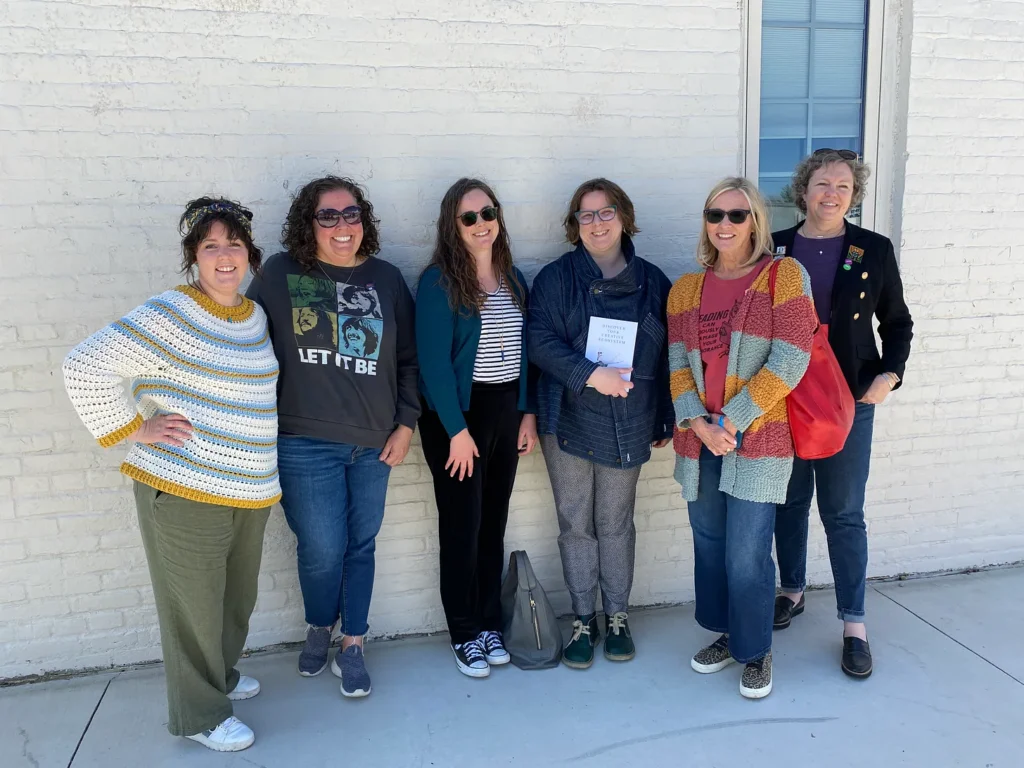
Then I did a short signing and sold 4 books. 🥳
(Shout out to my friend Lori Lynn who served as my “emotional support extrovert” and helped me make small talk at my signing table.)
It was really nice to see people respond to my book in real time. One woman immediately connected my book to The Artist’s Way which completely made my day. So thankful to everyone who dropped by to take a look.
Some lessons I learned and will be adding to my self publishing course:
- Print a QR code to purchase the ebook. (My hardcover is a deluxe edition and more people might have purchased the digital bundle at a lower price point.)
- Print my Venmo code. (Spelling it out did not seem to work.)
- Have something to hold business cards / stickers so they don’t blow away.
- Probably bring a book holder as well. The books kept tumbling off the table and one or two may be damaged.
Here is actual footage of me after the event. 😂
(That’s Odo from Star Trek Deep Space Nine.)
It took a lot out of me.
I realized that this simple brief appearance pushed me to the edge of my capacity and I definitely should NOT sign up for longer events any time soon. (After two hours I felt the way I normally do after a whole convention. )
I believe this is due to…
- More sensory overload on a daily basis from parenting.
- Diminished social capacity due to socializing with my toddler 24/7. (I’m just going to call him toddler till he turns 4, ok?)
- Not going to any events for 3-4 years during early motherhood / COVID times. I am both out of practice at masking and have no desire to return to that level of social performance.
Not only am I “re-entering” the world after COVID lockdowns, but I’m also learning how I want to show up as an autistic human. What does it mean to attend events without pressuring myself to mask (performing excitement, facial expressions, small talk, etc.)?
Even so I was pretty wiped out afterwards. Here is how I reset the next day:
- Time alone in the studio. I laid on the daybed and watched Netflix for an hour and then made a collage.
- Time with Davy in the backyard.
- A long walk with a podcast.
- Reading in the bath.
- Playing Cozy Grove with Davy. (More on that below.)
I’m still pretty tired, but I feel more or less human again. If I hadn’t been able to take that time I would have stayed in a perpetually burned out / shut down kind of state.
I still struggle with taking time for myself as a parent, but when I do I am reminded of how powerful and restorative it can be.
Of shoes & ships & sealing wax
Other bits & bobs to recommend this week.
Play
First off, I have rediscovered Cozy Grove. I played this a couple of years ago on my phone, but we just purchased it for the Nintendo Switch and I have been playing with Davy.
It’s a really cute and relaxing game.
You’re a scout marooned on an island haunted by (cute) bear ghosts. You run around the island finding things for them and helping them restore their memories. You can also fish and bake and craft and garden. The music and artistic style sets such an atmosphere. Have a peek.
I’ve heard it’s kind of like Animal Crossing, but in my opinion is cuter and more fun. (I tried Animal Crossing after finishing this game the first time and didn’t connect with it.) If you’re a casual gamer and just looking for a way to relax would really recommend Cozy Grove. 🥰
Read
The blog post of the week for me was How to Be a Good Assistant to Yourself by Austin Kleon.
Muse
This post by @worry__lines on Instagram is really good food for thought.
TOO Many Tabs
I’ve invented this section as inspiration to browse and close the tabs I keep open on Safari. I am always dangerously close to the 500 tab limit. Hopefully these creative breadcrumbs offer some inspiration.
Illustration
I absolutely love this 1970’s edition of The Sword in the Stone illustrated by Alan Lee. Merlin’s cottage has always been evocative for me and this is just how I’ve imagined it.
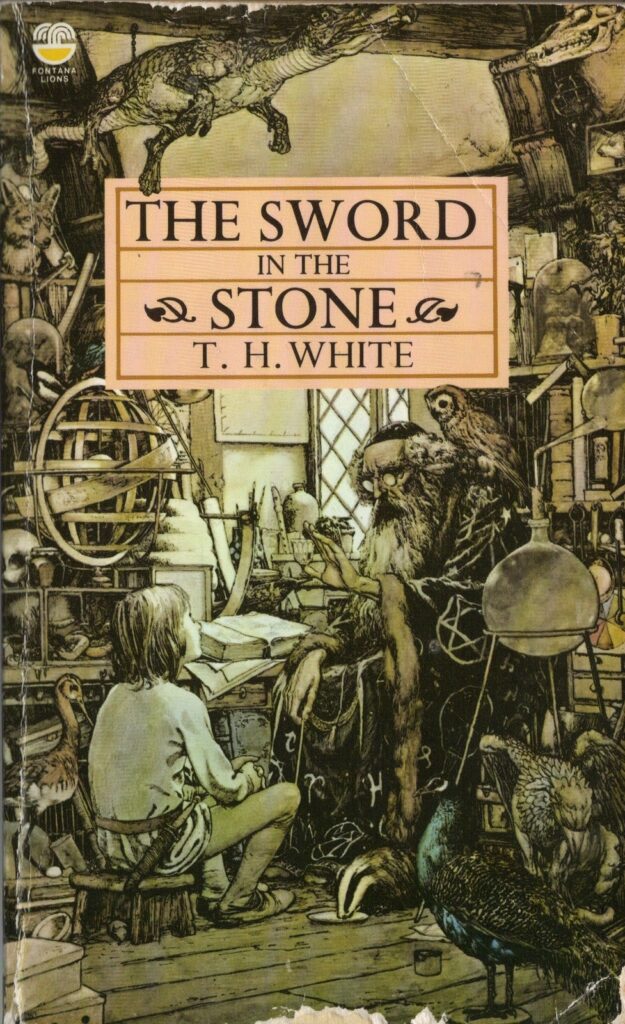
I made this discovery while looking for images of my teacher muses for home educating. A few weeks later I bought a copy from ABE Books so I really don’t need this tab open anymore.
Word Nerd
Etaoin shrdlu was used as a “red flag by typesetters to show an error in text, but sometimes it was overlooked and made it into print.” It is the approximate order of frequency of the 12 most commonly used letters in the English language.” via The Dusty Wheel
—
Wait, this is real?
This tab was open because I saw this butterfly on Instagram and didn’t believe it was real. Fact check!
It is indeed an orange oak leaf. Perfectly camouflaged on the outside with brilliant colorful wings when open.
Well that was effective! Maybe I’ll do this again. What do you think?
Thanks for reading!
I’d love to hear what you connected with and have a chat in comments.
Cheers,
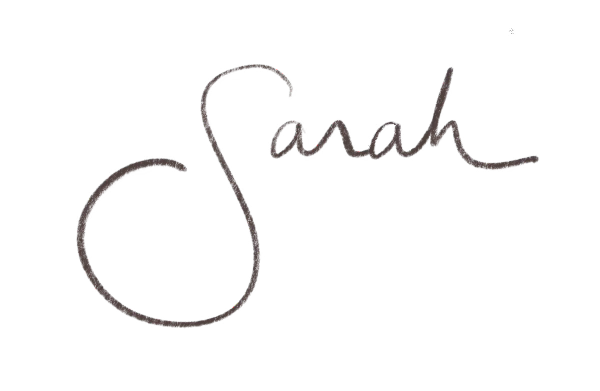
-
Yes, Hiatus
Read more: Yes, HiatusRaise your hand if you struggle to make time for yourself.
…it may be time for a Yes Hiatus.
We can be incredibly hard on ourselves. Our unrealistic expectations of what we can accomplish and what we are responsible for are our worst kryptonite.
We have to learn to say no sometimes.
Last September I hit a wall. I didn’t realize I was saying yes to everything until it was all happening at once.
– My first time selling handmade goods {anywhere} at AWBU.
– Photographing a wedding.
– {Almost} singlehandedly planning a Shakespeare festival.
– Teaching an online Theatre Appreciation class.
– Prepping for Project STIR‘s unrealistic original launch date.
– Attempting to start a blogger group for my alma mater.and…
the straw that broke the camel’s back… spontaneously agreeing to do an urban family photo shoot to get featured on a local blog {even though urban family photos aren’t really my thing…}
I found myself in full on overwhelm-mode.
But I still didn’t question the amount of projects I was working on until I was chatting to some of my friends. They were shocked at everything I was trying to juggle at one time.
That night was a real wakeup call for me.
I realized I had to stop saying yes to every opportunity that came my way. I had to give myself room to breathe or I was going to crash and burn. I couldn’t drop everything I’d already committed to, but I could stop saying yes to new things.
So I started a Yes Hiatus until February of 2015. And it was magical. I didn’t realize how many opportunities I was automatically saying yes to until I put the kibosh on it. And, yes, it was hard, but it was so worth it.
My biggest lesson was that the responses I got from saying no weren’t those I expected. I was afraid I’d hurt feelings or be looked down on or those opportunities would disappear if I didn’t grab them. But the opposite happened.
When a new friend I’d met at the blogging conference asked me to guest blog and I said no {the first no of my Yes Hiatus} I was blown away with her reaction…
“I hear ya!!! Thanks for keeping it real. And, I admire your boundaries. I’m finding I’m getting there myself!”
She was actually rooting for me. Good first step.
Then the no’s got harder. I was offered an opportunity to be January Blogger of the Month for Arkansas Women Bloggers. This was something I’d been secretly wishing for, and it was incredibly hard to turn down.
I explained my Yes Hiatus and asked if it would be possible to be Blogger of the Month later in the year. Now I’m scheduled to be ARWB of the Month in May.
{That was easy.}
This strategy really helped me keep my sanity throughout the last few months of 2015. I’d have had a complete mental breakdown if I hadn’t done it.
The added benefit of referring to it as a Yes Hiatus, which I actively called it during my experiment, is that it feels less negative than a straight no. So it can ease you into the idea of turning things down.
To be completely honest, a yes or two did slip in…
But only after initially telling myself “No” and then weighing pros & cons. I did end up flying to San Fransisco during my hiatus to see April Bowles-Olin on Creative Live. I really would have regretting passing that opportunity up and am so glad I went.
It’s been a few months since I ended my hiatus, and there are a few overarching lessons I’ve taken to heart. Tweet out your favorite!
1. Saying no isn’t the end of the world. It doesn’t always disappoint the way we imagine it will. It doesn’t make opportunities go away forever.
2. Saying no makes your yes stronger. By not spreading yourself to thin you’re able to put more energy and effort into the things you do say yes to.
3. Don’t let your automatic answer be yes. This experiment has definitely made me more aware of my tendency to take on too many projects. And it’s made my yes less automatic. Which is definitely a good thing.
When was the last time you hit overwhelm-mode? What do you think of trying a Yes Hiatus the next time it happens? Let’s chat in comments.
Cheers,
Sarah